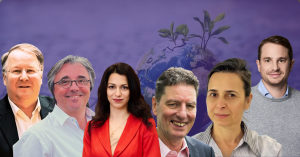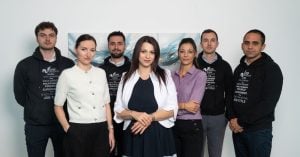Investors form one of the main pillars of economic development, contributing to job creation, innovation, business growth, but also to sustainable operating models and solutions. As we’ve seen in The Recursive’s analysis of the investor’s interest in sustainability, top financiers are increasingly focused on the balancing act between sustainability and profitability, by supporting businesses in bringing decarbonization or social impact solutions to market, while generating economic returns.
Today, we discussed with Dimitar Enchev, Managing Partner at PostScriptum Ventures, a venture capital group with a portfolio of renewable energy and energy efficiency investments, about the role of investors in supporting the economy’s decarbonization. Resalta, for instance, is one of the leading energy service companies in Central and Southeast Europe, helping clients cut down costs, reducing environmental footprint, and managing energy consumption.
PostScriptum was first established in 2006 and has maintained a focus on the ongoing revolution of the energy sector ever since, by supporting early stage and more mature ventures. Dimitar, who has been with the company from its early days, shared more about the their investment philosophy, as well as some of the biggest obstacles and opportunities for the ecosystem in achieving decarbonization.
The Recursive: What led you to join a sustainability-focused investment company?
Dimitar Enchev: I moved to London after studying in the US, and I was going to do either investment banking or venture capital. I was lucky enough to meet the founder of PostScriptum Ventures, Mark Crandall, who is now my partner. He had just set up his fund and was looking at the emerging field of renewable energy. I thought it was cool, but honestly, back then I didn’t understand it fully. It was a buzzword that I had yet to unpack. I just thought that making money while doing something good for the world was a very good idea. So, I convinced Mark to give me a job.
Six years ago, I moved out of London, the first PostScriptum fund had reached the end of its life, and we started the new PostScriptum fund, which is a global entity with its main team based out of Sofia.
Tell us a bit more about the type of investments at PostScriptum Ventures.
We invest in the ongoing energy transition. So, we mostly invest in sustainable companies and projects. We have investments in renewable energy (wind and solar), batteries, hydrogen, energy efficiency, etc. We are one of the investors behind the world’s largest energy project – the 26GW Asian Renewable Energy Hub, which is located in the Australian desert and is bigger than the Three Gorges Dam. We’ve also got a few off-topic investments in the IT space, but they are also companies that have a sustainability angle. We don’t normally invest in startups, but in more mature companies. Yet we are not your typical fund as we don’t have institutional investors, and we don’t have a restrictive fund mandate – we have quite a bit of operational freedom. If we see something that we think is a good idea, we will do it. We have actually invested in one startup before. We have portfolio companies across the world – Bulgaria, UK, Australia, the US.
How do you see your role in helping the market address sustainability challenges as an investor?
The role of investors and the role of the market are super important. I think it’s the only way to solve challenges of the scale we are facing today. Every day, we’re getting more and more alarming news about what’s happening with the world. I think it is such a fundamental and massive challenge that you can only solve it if you fundamentally change the way the market works by sending the right pricing signals. You need to start putting a price on all the externalities of business operations, including the environmental aspects. So, I think it’s super important to have the right frame and the right market forces working in the right direction.
In what industries and verticals do you see the best opportunities for companies to contribute to sustainability?
First, the world must decarbonize completely. So, this is not just about electricity. It’s not just about wind turbines and solar power. This is going to be the biggest paradigm shift the world economy has experienced since the industrial revolution. Every single manufacturing process, every single part of the economy is going to be affected. It’s about agriculture, construction, industry – the whole European economy needs to be redrawn and become carbon-free in 30 years. That’s mind-boggling!
Decarbonizing the whole economy presents an almost endless number of opportunities. In Southeast Europe, it is particularly good from a business opportunity point of view because we’re starting from the worst position. It’s one of the most carbon-intensive parts of the European economy. Electricity generation is still dominated by old, dirty coal.
But SEE is particularly strong in the IT space, and part of the decarbonization of the electricity sector is going to go through decentralization and digitalization. So, SEE can play a role with a strong IT sector in the digitalization of what is inherently a very old, analogue industry.
At the big picture level, you first need to clean up the electricity generation sector, so that means all the coal must go. Then eventually, the gas must go. You’re going to be generating clean renewable power from wind, solar, hydro, and nuclear. Managing the intermittency of renewables will be more complex than managing the power grids of today. It will require the system to be smarter, more decentralized and more digitalized. Once that’s in place, electric vehicles ramping up will decarbonize a large part of the transportation sector. In the automotive manufacturing sector, the transition is going to be dominated by large foreign companies, established automakers. But there is an opportunity along the value chain for companies of all sizes – manufacturing components, building charging stations and infrastructure, the digitalization of different services, the software that everything runs on. Startups can play a role in the space because this is an entire large industry getting disrupted.
You are also going to see the electrification of a lot more than just the transportation sector – heating, some parts of industry, and so on. For some sectors electrification won’t be possible, and green hydrogen can play a role there.
What do you see as the biggest obstacles with investing in sustainability decarbonization projects in the region?
16 years ago, when I started in this space, it was a choice between economics and environment. Do you want to pay a little bit more for your energy and protect the environment, or are you only concerned with the cost? Now, that fundamental change in the energy sector is that cheap energy is also clean. Wind and solar are dramatically cheaper than anything else. So, price is no longer a major obstacle. The obstacle that remains is ambition, because the energy and the transportation sectors, as opposed to the IT industry, are very dominated by governments. And governments are very slow, they lack vision, and they are not fully on board with what needs to happen for the energy transition.
Currently, when Europe creates decarbonization policies and frameworks, the local governments in our region set to achieve the absolute minimum. They see this as an imposition, as something bad, and they are trying to do as little as possible. The current set of policy is not nearly ambitious enough, or as fast and as comprehensive as it could be.
What do you want to hear in the pitch of a company offering a solution to sustainability?
The things I look at are awareness and understanding of the global context, as well as of your competitive advantage. Putting the green label on something doesn’t mean you’re going to be successful, and it doesn’t mean it’s actually a good idea. What is the global context and how does your solution fit in? It’s very dependent on the differentiating aspects of the region. Just as an example, Europe has come a long way, but we’ll never be competitive versus the Chinese or Koreans at producing mobile phones. You need to pick your battles, after identifying areas where you can have a competitive advantage.
Something that trumps all considerations is the team. It is not enough to have the best idea and the brightest technology – you must also have the right team.
What metrics do you look at in terms of the company’s self-sustaining ability and their impact on society and the environment?
In the energy transition space, our investments are positive for the environment by default. Having said that, metrics vary from business to business but, for example, in the renewable energy space, a clear metric that can be tracked is related to the CO2 emissions eliminated/ saved. Other things you can look at are the number of megawatt hours of green energy generated, or the coverage of households with renewable energy sources. These are easy to analyze. And the same thing with efficiency. For example, we’ve got an energy efficiency company which is investing in various projects in the EU. Here, we look at the energy savings in terms of avoided carbon emissions.
Are there any companies that you wish you had invested in?
The obvious regional unicorn in this space is the Croatian Rimac Automobili. This is a fantastic company. It’s not that anyone came to us to ask for an investment, but if they had, we would have been very happy to have them in our portfolio. Unfortunately, I think I will have to settle with just becoming a client one day.
How do you stay up to date with sustainability knowledge and trends?
From books, newspapers, magazines, podcasts. For example, there is a relevant podcast called The Redefining Energy, which is hosted by one of our bankers. We are lucky that there are a lot of fantastic sources of information and knowledge these days. It’s just a matter of being proactive and finding them.








